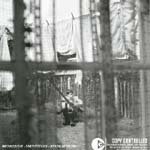
Paul McCartney Chaos and Creation in the Backyard
(Capitol)
Sitting down to write a review of a new Paul McCartney album one feels the weight of history, the wrath of critical derision and even the supplication of juvenile idolatry pressing on one's shoulders. When faced with such a prospect I ask myself "What would Lester do" (Bangs, that is). My thought, based on his love/hate relationship with Lou Reed, is that he wouldn't hide his fan status, but it wouldn't stop him from being brutally honest, even personally insulted, by his hero's bad choices. Taking this as a model I want to state right up front that, unlike the majority of the critical establishment, I actually like a lot of Paul's solo material. Sure he's done his share of cloying pap, but when you put the songs on the scales there is more good than bad, and some of his albums, like London Town and Back to the Egg, are undeservedly bashed. Even the wasteland of his 80's work has enduring moments. I think Average Person is a great song, so sue me! I don't know what this says about my musical taste, and I don't rightly care.
Here's one thing I do know. The last time he has put together 3 back to back albums of original material as solid as Flaming Pie, Driving Rain and his new one, Chaos and Creation in the Backyard, was way back when in nineteen seventy-, wait a minute, he's never done it! Certainly Linda's illness and death had to shake him out of the boredom and complacency last heard on 1993's Off the Ground. I'd even venture to guess that George's untimely death has affected him perhaps more deeply than John's. Recall that George was his oldest friend, that they seemed to reconcile for 1997's Anthology and that Paul regularly honors George with a ukulele version of Something in his live show. In any event, Paul's carefully domesticated life has suffered some major blows. The warm glow of a billion dollars won't provide any solace from such hardships. As a result, his recent albums have been injected by the shocking jolt of raw feeling, a quality that went missing from Paul's music decades ago. Let's hope it never seeps away.
In the accompanying DVD, producer Nigel Godrich (Radiohead, Beck) relates how he told Paul that he'd only work on songs that he liked (what a novel, and cheeky, concept). The result is that most rarefied of things, a Paul album with no throwaways. We haven't gotten one of those since Band on the Run. It kicks right off with a catchy riff and an even catchier tune on Fine Line. We might think we are getting the trite, facile Paul but on the first instrumental break we get a rising chromatic line that interjects some painful dissonance. In fact, Paul's frequent use of chromaticism channels his now departed colleagues, and you could almost hear them over his shoulder, egging him on. He himself labeled the excellent Friends to Go a 'George' song, which is exactly right and a fitting tribute to a quirky and occasionally brilliant songwriter. This approach works wonders and you can hear how some songs like English Tea, a demitasse of whimsy few outside of the Kinks and XTC could pull off, easily might have degenerated into filler without another ear, dead or alive, refining and editing. I even found myself touched by the obvious sentiment of Too Much Rain, due to a Beatle-esque arrangement (those boys always knew where to put a tambourine) that keeps things moving.
Paul played almost all the instruments here, but the comparisons with McCartney's I and II are misleading. Those albums were charming in their haphazard way, but Chaos is one of the best sounding albums of his career, period. This is a testament to his instrumental talent as well as Nigel's deft hand at the controls and with the conductor's wand. The arrangements are superb, simply because they are subordinate to the material, which holds up under the scrutiny of repeated listening.
I know I sound a bit effusive here, but there is something miraculous in an artist who, like Dylan, has found a new vitality after years of uninspired hacking. And while Paul is not likely to ever again churn out the kind of blinding inspiration last heard on Abbey Road, he is practicing the craft of songwriting at a level equal to his abilities and rarely heard in today's fragmented musical marketplace. See the Chronology from Ian MacDonald's Revolution in the Head for further details.
1 October, 2005 - 23:00 — Alan Shulman